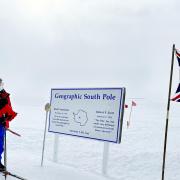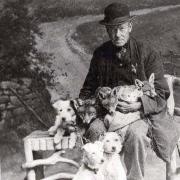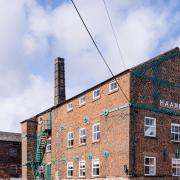Andrew Griffiths wades in to the Darley Dale headquarters of Peak UK to find out the secrets of its success

When Joe Clarke crossed the finishing line to take the gold medal in the 2016 Rio Olympics for canoe slalom, the crescendo of emotion unleashed had many strands. First there was the athlete's, whose years of training and dedication had brought together a blend of natural talent and application to achieve the ultimate goal: Olympic gold. Then there was the great surge of pride those of us watching at home felt in our nation. We were all winners that day, experiencing that elusive 'feel good factor' that makes us part of another's achievement.
However, there was one person who probably thought he had more of a stake in Joe's success than most: Pete Astles, founder of Peak UK, an award-winning design and manufacturing company that specialises in paddlesport clothing and equipment. Not only had Pete's company supplied Team GB's kit - something he'd already done for London 2012 - for Rio they'd also created a new buoyancy device. By putting the buoyancy material between the athlete's legs, it gave the competitor's upper torso greater freedom, allowing them to make tighter turns around the gates in the canoe slalom.
When world class athletes are at the top of their game and trained to within an inch of their lives, the one who comes out on top is the one who can make marginal gains. Joe Clarke beat his nearest rival by 0.17 of a second to take that gold. Pete Astles' low slung buoyancy jacket has earned him the right to have at least a quick polish of that medal.
'It was a completely secret project until that point,' Pete tells me, as he shows me the jacket hanging on the wall of the design studio when I visited Peak UK's headquarters in Darley Dale. Now, Pete is looking to supply every nation in the canoe slalom events for the upcoming Olympics. Such is evolution, and the search is on for the next 'marginal gain'.

Pete's journey - or perhaps that should be 'paddle along the river' - has been an interesting one. He started the business when a student, making clothing in his spare time from a friend's back bedroom. The company now turns over £1.75m, employs ten people in Derbyshire, and 50,000-60,000 garments a year pass through this Darley Dale warehouse. Fifty per cent of sales are to the UK, 40 per cent to Europe and 10 per cent to the rest of the world. The business is 'bursting at the seams' according to Pete, and at the time of visiting, the only thing preventing expansion was Brexit uncertainty. Paddlesports is riding a wave.
Pete is a keen canoeist himself and competed at national junior level. Like many a serious paddlesport enthusiast in the early 1990s, he made his way to Nottingham, where they had built white water facilities so the dedicated canoeist could train seven days a week. To fund himself, Pete got a job in the local Kayak shop, but 'the gear we sold didn't follow any kind of fashion, the fabrics we sold weren't very technical, or breathable.'
Then, something happened that would have been disastrous for some people, but turned out to be the making of Pete's future career: he got glandular fever and the doctors told him he couldn't train for six months.
'When you are used to training 12 times a week and suddenly you can't do anything, you start thinking of other things,' says Pete. 'That's when my business started - I thought I could actually design some garments myself that were a little more technical and tailored specifically.'

Pete was surrounded by young, elite athletes at a time when an alternative youth culture was starting to bloom. 'I suddenly realised there was a demand so I borrowed enough money off my Dad to buy some fabric and a sewing machine, and I started making the garments in my friend's back bedroom,' says Pete.
It was a case of right place at the right time, and he never looked back. The back bedroom was soon exchanged for a business incubator unit in Nottingham, then a move to the Mills at Cromford, where he now lives because he 'missed the hills' of his Lake District upbringing. This was in 1995. By the time they were designing the kit for the national team in the 2012 Olympics they had moved to their current premises in Darley Dale.
Peak UK operates in a niche market - there are only five such manufacturers in the world. What sets Pete's approach apart is his idea to combine very cool designs with highly technical fabric. In a sport popular with students and young professionals, this combination of performance and style has proved a winning strategy. As we stand in the design studio, I am looking at clothing with some strange blue cartoon creature on it. 'It's a unicorn,' says Pete. He nods over his shoulder: 'Paul comes up with all these designs.' Paul sits modestly at his computer, designing.
The secret of Pete's success is that he is a genuine enthusiast himself and passionate about the sports he participates in, as are his friends, of whom Paul the designer is one. He essentially comes up with an idea that is missing in the market and that he and his mates would like to use, then fulfils it.

'We're always interested in everything. For instance, I got into sea kayaking, so we developed sea kayaking equipment,' says Pete. 'I've become a parent recently so we've developed children's products. Everything we make isn't for commercial reasons, it is for our own use really.' It just happens to find a global market, too.
Down in the warehouse, at the loading bay, Phil is packing a container van with goods destined for the Netherlands. Pete shows me the paperwork - a single sheet of paper. 'It's as easy as sending it down the road currently, so why would we change that?' Pete tells me.
Paddlers here play their sport in beautiful places - the rivers, canals and open waters of the UK, and Peak UK is taking a lead in introducing environmentally responsible policies. The company has done away with single-use plastic and their garments are no longer individually packaged in plastic bags - instead they are tied up in hemp string with a recycled card label. It is 'old school meets high tech' and it looks very cool indeed. They use recycled plastics in the manufacturing process as much as possible - for instance, this year their jackets are being made with 55 per cent recycled yarn. Environmentally friendly yes, but given their student and young professional customer base it is very savvy marketing too.
'My supply chain has to catch up,' says Pete. 'In the future we want to be more sustainable.'
I ask how much this policy adds to the price of a garment. Pete does a quick bit of mental arithmetic. 'It probably adds £5 or £10 maximum to a retail price.' Given that their jackets retail from between £200-£250 this is unlikely to be a deal breaker. This is how change happens.
Last year Pete launched a local initiative called Paddle Peak, with the aim of improving both participation in the sport and access to the region's waterways. River access is currently contested by landowners and other users. Paddlers are not generally welcomed on Peak District reservoirs, in stark contrast to the access enjoyed in the Lake District, for example.
'People will call and say: "I want to take up kayaking, where do I go?" And to be honest we shrug our shoulders, because effectively there is about half a mile of the River Derwent that is uncontested for people to go kayaking,' says Pete. 'We've found that in the Peak District National Park there is actually nowhere you can go.'
We are joined by Ben Seal, Places to Paddle Manager for British Canoeing, the sport's representative body for everyone from elite competitors to weekend family paddlers. Ben is currently campaigning to improve water access nationally. As the law is currently interpreted, paddlers should not be accessing privately held stretches of river without permission, though British Canoeing would contest this.
'Paddle Peak is a really good example of how local people are picking up the initiative of our national campaign,' says Ben. 'The very heart of our campaign is the aim to get people active on the water, to enjoy the natural surroundings, but also to protect it. The action Paddle Peak is taking to clean-up the river and remove litter is a fantastic way of showing how paddlers are caring for the environment.'
'Part of our Paddle Peak project is about sharing the river responsibly with other users,' says Pete. 'We need to sit down around a table and talk to these other users, we can develop a code of conduct, we can talk about the pros and cons for all of us.'
The collaboration between Peak UK and British Canoeing is an important one. Peak UK gets access to elite competitors and develops its product range with the best in the business and helps them to win more medals - this then 'trickles down' to benefit the more casual user as innovations are incorporated into the bulk production, which is manufactured at its bases in China.
For British Canoeing, the governing body of the sport, it gives Ben access to the people who actually go canoeing and kayaking, the recreational paddlers who make up 80 per cent of its membership. 'We've got a really good relationship and it can only get better,' says Ben.
The future is looking good for Peak UK and Pete Astles is relishing the challenges that lie ahead. The company aims to supply every national team in the canoe slalom event at the Tokyo Olympics later this year. The market is a niche one, but they are specialists within it and know their business well. It is a real Derbyshire success story, and fitting that it is one at the cutting edge of the textile manufacturing process, taking its place in the line that began at Cromford Mill. Arkwright would surely be proud.



























